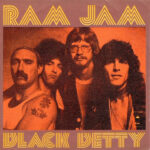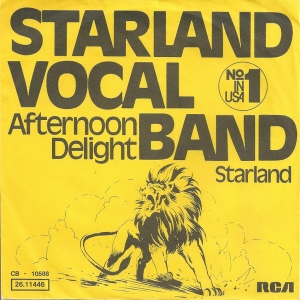 Ram Jam’s “Black Betty” is one of rock music’s most electrifying tracks, combining relentless energy, unforgettable riffs, and an enduring appeal that spans generations. Released in 1977, the song transformed a traditional African-American folk tune into a hard-driving rock anthem, blending history, rhythm, and raw power into a brief but explosive musical experience. Its aggressive guitar, pounding drums, and commanding vocals make it an adrenaline-charged track that captures the spirit of rock and roll in its purest form.
Ram Jam’s “Black Betty” is one of rock music’s most electrifying tracks, combining relentless energy, unforgettable riffs, and an enduring appeal that spans generations. Released in 1977, the song transformed a traditional African-American folk tune into a hard-driving rock anthem, blending history, rhythm, and raw power into a brief but explosive musical experience. Its aggressive guitar, pounding drums, and commanding vocals make it an adrenaline-charged track that captures the spirit of rock and roll in its purest form.
Beyond being a hit single, “Black Betty” represents the evolution of music across eras. Its origins as a work song, the reinterpretation by Lead Belly and other early artists, and Ram Jam’s electrified adaptation illustrate the ways music can traverse genres while maintaining its emotional core. The song’s ability to feel both familiar and immediate ensures it remains relevant decades after its release.
The Origins of ‘Black Betty’
Before Ram Jam’s version brought the song to rock audiences, “Black Betty” had a long history as a folk and work song. Early recordings, including Lead Belly’s iconic rendition, emphasized rhythm and repetition, using simple instrumentation to create hypnotic momentum. The lyrics referenced “Black Betty,” which has been interpreted variously as a bottle of whiskey, a musket, or a woman, and the song’s delivery conveyed both storytelling and rhythmic purpose.
These original versions were minimalist and percussive, designed to accompany work and movement, capturing the raw energy of life and labor. Ram Jam’s 1977 adaptation took this foundation and amplified it for a rock context, adding electric guitar, driving drums, and high-octane vocals, transforming a historical tune into a modern rock powerhouse.
Ram Jam and the 1970s Rock Scene
Ram Jam formed in the late 1970s with a lineup that included Bill Bartlett on guitar, Myke Scavone on vocals, Pete Charles on drums, Howie Blauvelt on bass, and Tommy Scott on additional guitar. Though the band had a relatively brief career, “Black Betty” became their defining hit and a signature song of the era.
The 1970s rock landscape was marked by experimentation and high-energy performances. Bands explored heavier sounds, intricate guitar work, and rhythmic precision. Ram Jam fit seamlessly into this environment, merging folk roots with a modern rock approach. Their version of “Black Betty” exemplified this fusion, combining storytelling, rhythm, and amplified energy in a way that resonated with audiences hungry for bold, direct rock music.
Instrumentation and Musical Drive
At the heart of “Black Betty” is its driving instrumentation. The opening guitar riff, sharp and instantly recognizable, establishes the song’s momentum and serves as its backbone. This riff loops throughout, creating a sense of relentless forward motion.
Pete Charles’ drumming is powerful and precise, punctuating the riff with a sense of urgency and force. Howie Blauvelt’s bass adds depth, complementing the guitar and drums without diluting their intensity. The interplay between instruments creates a hypnotic yet energetic sound that engages listeners from the first note to the last.
Vocals play a key role in the song’s impact. Myke Scavone delivers the lyrics with grit and authority, alternating between melodic phrases and shouted urgency. His performance matches the song’s intensity perfectly, transforming it from a historical tune into a high-energy rock anthem.
Lyrics and Repetition
The lyrics of “Black Betty” are minimal but highly effective. The repeated refrain—“Whoa, Black Betty, bam-ba-lam”—creates a chant-like quality that reinforces the song’s hypnotic rhythm. The simplicity of the words allows the music to take center stage, with the instrumental drive and vocal energy conveying much of the song’s emotion and excitement.
This repetition mirrors the song’s work-song origins, where rhythm and movement were central. By keeping the lyrics sparse, Ram Jam preserved the hypnotic, almost trance-like energy of the original while translating it into the language of rock and roll. The result is a track that is both visceral and immediately engaging.
Cultural Impact and Controversy
“Black Betty” was met with widespread acclaim for its energy and rock sensibilities, but it also sparked discussion about cultural appropriation. The song’s origins in African-American folk music raised questions about the adaptation of historical work songs into mainstream rock contexts. Despite this, Ram Jam’s version achieved significant commercial success, charting on the Billboard Hot 100 and becoming a staple on rock radio stations.
Over time, “Black Betty” has become a cultural touchstone, appearing in films, television shows, and advertisements. Its driving rhythm and unforgettable riff have ensured its presence in popular culture, while its folk origins continue to prompt discussion and exploration of musical heritage.
Legacy and Influence
The legacy of “Black Betty” extends beyond its chart success. Its aggressive guitar riffs, hypnotic rhythm, and chant-like vocals influenced later rock and hard rock acts, especially those interested in blending historical motifs with contemporary intensity. The song also inspired covers and reinterpretations across genres, from hard rock to electronic music, demonstrating its versatility and enduring appeal.
Musicians and audiences alike continue to be drawn to “Black Betty” for its energy, simplicity, and emotional impact. Its ability to connect historical roots with modern sensibilities ensures it remains a relevant and inspiring work decades after its release.
Why ‘Black Betty’ Endures
The song’s enduring appeal lies in its combination of historical significance and pure rock energy. Ram Jam preserved the rhythm and narrative of a centuries-old folk song while transforming it into a hard-rock anthem capable of thrilling contemporary audiences. Its hypnotic riff, relentless drumming, and commanding vocals create an immersive listening experience that engages both physically and emotionally.
The song’s simplicity also contributes to its lasting impact. By focusing on rhythm, repetition, and energy, Ram Jam crafted a track that is immediate, memorable, and universally accessible. Whether experienced live or through a recording, “Black Betty” delivers an intense musical experience that feels both timeless and immediate.
Conclusion: A Rock Anthem for the Ages
Ram Jam’s “Black Betty” is a prime example of how music can evolve while maintaining its emotional core. By electrifying a historical folk tune, the band created a high-energy rock anthem that continues to resonate with listeners across generations. Its driving riffs, pounding drums, and unforgettable vocals make it a song that commands attention, while its folk origins lend depth and historical resonance.
The track’s enduring popularity and influence reflect its unique combination of simplicity, intensity, and musicality. “Black Betty” captures the thrill of rock and roll while honoring the power of rhythm and storytelling, bridging centuries of musical tradition in just a few minutes.
Even decades after its release, the song remains a fixture in popular culture, a staple of rock radio, and a source of inspiration for musicians and fans alike. Ram Jam succeeded in transforming an old folk song into a modern classic, creating a track that is thrilling, timeless, and unmistakably powerful. “Black Betty” is rock and roll at its purest—unrelenting, electrifying, and unforgettable.


